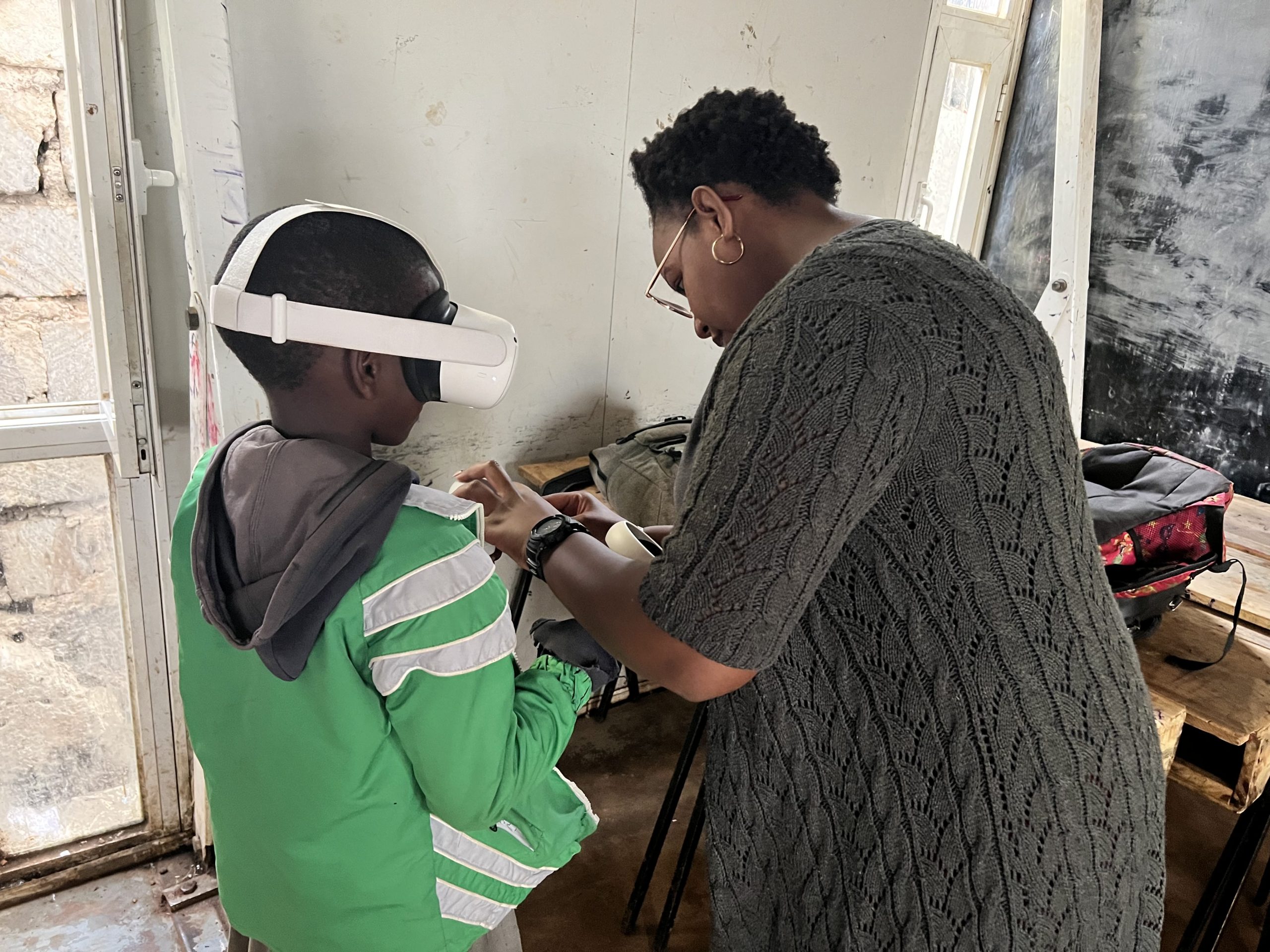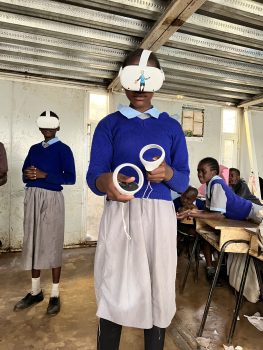Breaking Down Barriers: Revolutionizing Education Through Virtual Reality
May 31, 2023



Step into a classroom at MCEDO primary school in Nairobi with me. This particular room features low walls and a roof made of corrugated iron sheets. Inside, you’ll find three rows of desks arranged in columns. As we look around, we notice pairs of students seated in rows, fully engaged in discussions about a recently assigned project. Meanwhile at the back of the class, a few of their classmates wear Virtual Reality(VR) headsets which transport them to a virtual world, where they test their knowledge of plastic pollution by playing a game. The two girls and a boy make slight movements as they confidently navigate their world that has them oblivious to the discussions happening in low tones around them. This is the final of a 10-part series of sessions in the school by Ukwenza VR where the students have comprehensively learnt about plastic pollution.

Ukwenza VR is a social enterprise creating virtual reality content to enhance digital learning. In this excerpt from our conversation with Njeri Ndonga, Co-founder and Team Lead at Ukwenza VR and Amani Institute Fellow, we learn more about their work and its significance in captivating young minds while growing their understanding of subjects that might seem complex but are critical to securing not just theirs but our planet’s future.
The origins – where did it all begin?
Setting up Ukwenza VR was not a one day decision, it was a process resulting from shared creative spaces, conversations where we exchanged ideas and eventually a mission to create equity in education. My co-founder Gathuka Mwangi and I had worked together in film-making and we always knew that there were a lot of opportunities around virtual reality. We however did not know it could be a business.
Because of my Social Innovation Management (SIM) program background, I had figured out that I never wanted to run a business for profit only. In the depths of my heart I knew that I would run a social impact business. And so after a career in TV production and stint in running a retail business, I found my way into storytelling consultancy. Gathuka on the other hand had his own consultancy where he was doing advertising and content production for SMEs while also working as a graphic designer. In 2017, he came across a 360 video that inspired him to buy a 360 camera. He did one project for a client but that was it – nobody else was interested in VR at the time and there was not much to help us understand the landscape.
What prompted the move to turn this into reality?
When we looked at VR and emerging technology we realized that there was lots of excitement around it but rarely did it come with the need for social impact. Most of it was profit driven and people wanted to grab the opportunity first and lock out everyone else as fast as possible. We were keen on doing something creative but didn’t have the resources to do it, and the opportunity to change this presented itself mid 2018. I learnt about and applied for an AR/VR (Augmented Reality/Virtual Reality) hackathon which we participated in and won.
Towards the end of that year a SIM Fellow working in conservation reached out to me – they were looking for innovative ideas, and ours that won the hackathon was a VR tour of a park, which fell in line with their agenda of conservation education. We were selected as one of the enterprises for WWF Pandalabs incubation program, giving us an opportunity to create content and test it in schools.
The pandemic hurdle and jumpstarting the business
In 2020 COVID strikes and Ukwenza VR took a step back with schools closing and the uncertainty around the disease. We restarted the conversation on Ukwenza VR in 2021 despite having no revenue, no income, no clients – we just had an idea and a dream. In early 2022 we applied for and received the Afriplastics grant. This gave us resources to launch fully and embark on a large-scale campaign. We also participated in and won in the virtual category of the 2022 AR/VR hackathon. We were also part of the Electric South XR social impact grant which has allowed us to continue creating content and test its applicability.
What is the impact of the projects you have run so far
Between 2021 and 2022 we visited about 8 schools and worked with multiple partners and participated in events. We’ve also worked with communities which has allowed us to continue interacting with and validating our ideas while spreading important messaging on issues such as plastic pollution. We have worked with nine schools to date, largely running a 10 week curriculum that helps students improve their knowledge and mindsets on plastic pollution while enhancing skills such as teamwork, self-expression, creativity, critical thinking and public speaking. This project has enabled the children we interact with to take small actions to sustainably manage plastic pollution.
What next for Ukwenza VR
We are at the intersection of a huge transition in the application of technology in education so we want to be the pioneers of that, but also challenge the model of for profits and really focus on impact. We want to show people that you can have a successful company and create a lot of impact.
We want to create equity in education – we dont want VR to be like the use of computers in schools. Currently computers are the mainstay of our interaction with the world but most schools don’t have them so students leave school with little to no skills. We’d love to change that for VR.
We focus on making sure that we re-invest our revenues into supporting schools that would otherwise not afford VR. So a big part of what we do is supporting schools that would be left out in a traditional business model.
********************************************************************************************************
Our conversation with Njeri brings to mind the late Prof. Wangari Maathai’s story of the hummingbird – an inspiring tale of courage and determination. In her story, she narrates about a forest on fire, with all the animals helplessly watching as the flames engulf their home. However, a tiny hummingbird decides to take action and starts carrying droplets of water in its beak, dropping them onto the raging fire. When the other animals question the hummingbird’s seemingly futile efforts, it responds by saying, “I am doing the best I can.” The hummingbird’s response highlights its determination to make a difference, no matter how small, and encourages others to do the same. Ukwenza’s work is nurturing children, who like the little hummingbird, take their new knowledge into their homes and communities. In the long term and as the number of these little hummingbirds grows, we are sure that their impact will not only be seen but felt inside and out of their communities.
If you would like to support Ukwenza VR’s mission to make education more equitable by delivering world-class VR experiences, please get in touch with the team via [email protected]
